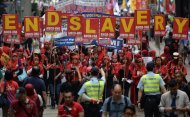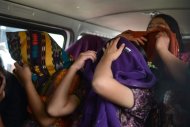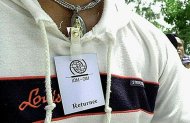After years of warnings, the United States on Friday named and shamed Thailand, Malaysia and Venezuela dumping them at the bottom of a list of countries accused of failing to tackle modern-day slavery.
The three countries, plus Gambia, found themselves added to nations such as Iran, North Korea and Syria already languishing on the lowest tier of the State Department's annual report into human trafficking -- a designation which could trigger US sanctions.
"We each have a responsibility to make this horrific and all-too-common crime a lot less common," US Secretary of State John Kerry wrote in the 2014 Trafficking in Persons report, denouncing what he called "the evil of human trafficking."
It was a challenge "inextricably linked to the broader effort to spread the rule of law and face the crisis of failed and failing states," he said.
The scale of human trafficking is staggering. The International Labor Organization estimates some $150 billion in profits are generated annually for private businesses from trafficking, of which $99 billion goes to the sex industry.
And an estimated 20 to 27 million people are believed to live in slavery around the world.
"While such abuses may seem far away, they are in reality very much a part of our daily lives. Many of our fruits and vegetables, clothes, electronics, and other consumer goods are products of supply chains in which exploitation is used to gain a competitive advantage," the report said.
Tens of thousands of the world's trafficking victims end up in Thailand as migrants from neighboring countries "who are forced, coerced, or defrauded into labor or exploited in the sex trade," the report said, which was carried out before the military coup.
A high number are exploited in the fishing industry as well as garment factories or end up as domestic maids.
"Anti-trafficking law enforcement efforts remained insufficient compared with the size of the problem in Thailand, and corruption at all levels hampered the success of these efforts."
- Trafficking victims jailed -
Malaysia was also downgraded to the so-called Tier 3, after ignoring warnings to draw up a plan to comply with "the minimum standards for the elimination of trafficking."
Many Malaysian recruitment companies bring in workers who incur huge debts to people smugglers and ending up working in bondage on farms, fishing boats or again as prostitutes.
Those who manage to escape often ended up being incarcerated by the Malaysian authorities -- sometimes for as long as a year -- faulted by the State Department for "flawed and inadequate" efforts to improve the country's victim protection program.
Venezuela too found itself back on lowest ranking, after having been on the State Department's Tier Two watch list since 2012, because it has no "written plan" for the elimination of trafficking.
Venezuelan women are often taken by small boats to Caribbean islands and forced into prostitution, while children are enslaved to work as domestic servants.
There were also reports that some 30,000 Cuban doctors working in Venezuela on government social programs experience forced labor, are denied full wages and threated with reprisals against their families if they complain.
US President Barack Obama can choose to impose sanctions on countries which linger at the bottom of the list, but State Department officials acknowledged he had waived that option against China and Russia which were downgraded last year.
On the plus side, prosecutions for human trafficking rose around the world in 2013 to 9,460, up from 7,7705 in 2012, and more than 44,750 victims were identified.
Of the 188 countries in the report, about 15 were downgraded from last year, while a further 15 moved upwards -- rewarded for their efforts to address trafficking.
Chile and Switzerland moved up to the top ranking Tier 1 alongside countries such as Britain and the United States.
"What trafficking victims endure is incomparable to what most of us confront in a lifetime and should put into the context of the small injustices and frustrations of our daily work and lives," said Ambassador Luis CdeBaca, the envoy in charge of combating trafficking.















